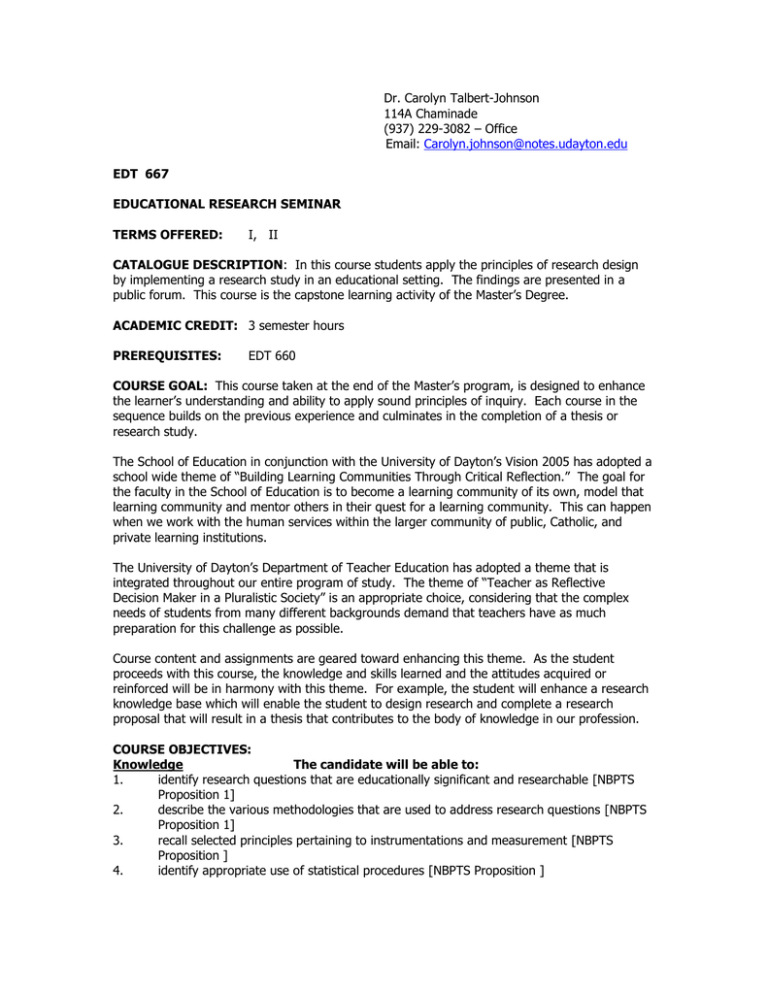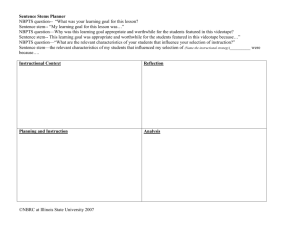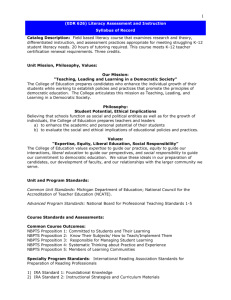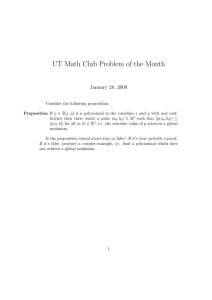Dr. Carolyn Talbert-Johnson 114A Chaminade (937) 229-3082 – Office
advertisement

Dr. Carolyn Talbert-Johnson 114A Chaminade (937) 229-3082 – Office Email: Carolyn.johnson@notes.udayton.edu EDT 667 EDUCATIONAL RESEARCH SEMINAR TERMS OFFERED: I, II CATALOGUE DESCRIPTION: In this course students apply the principles of research design by implementing a research study in an educational setting. The findings are presented in a public forum. This course is the capstone learning activity of the Master’s Degree. ACADEMIC CREDIT: 3 semester hours PREREQUISITES: EDT 660 COURSE GOAL: This course taken at the end of the Master’s program, is designed to enhance the learner’s understanding and ability to apply sound principles of inquiry. Each course in the sequence builds on the previous experience and culminates in the completion of a thesis or research study. The School of Education in conjunction with the University of Dayton’s Vision 2005 has adopted a school wide theme of “Building Learning Communities Through Critical Reflection.” The goal for the faculty in the School of Education is to become a learning community of its own, model that learning community and mentor others in their quest for a learning community. This can happen when we work with the human services within the larger community of public, Catholic, and private learning institutions. The University of Dayton’s Department of Teacher Education has adopted a theme that is integrated throughout our entire program of study. The theme of “Teacher as Reflective Decision Maker in a Pluralistic Society” is an appropriate choice, considering that the complex needs of students from many different backgrounds demand that teachers have as much preparation for this challenge as possible. Course content and assignments are geared toward enhancing this theme. As the student proceeds with this course, the knowledge and skills learned and the attitudes acquired or reinforced will be in harmony with this theme. For example, the student will enhance a research knowledge base which will enable the student to design research and complete a research proposal that will result in a thesis that contributes to the body of knowledge in our profession. COURSE OBJECTIVES: Knowledge The candidate will be able to: 1. identify research questions that are educationally significant and researchable [NBPTS Proposition 1] 2. describe the various methodologies that are used to address research questions [NBPTS Proposition 1] 3. recall selected principles pertaining to instrumentations and measurement [NBPTS Proposition ] 4. identify appropriate use of statistical procedures [NBPTS Proposition ] 5. 6. 7. 8. Skills 1. 2. 3. 4. 5. 6. 7. 8. 9. describe the data collection techniques associated with research that [NBPTS Proposition] addresses questions that are from the positivist and interpretivist paradigms identify the components of a research proposal, including introduction, review of literature and /or theoretical framework, and methodology [NBPTS Proposition 1] describe appropriate procedures for maintaining an ethical and professional stance while conducting research, including protection of subjects/participants [NBPTS Proposition 2] describe the principles and practices underlying teacher/action research [NBPTS Proposition 1] The candidate will be able to: employ a variety of data collection techniques [NBPTS Proposition 1] interpret numerical data through selected statistical procedures [NBPTS Proposition 3] apply interpretive techniques to a set of qualitative data [NBPTS Proposition 3] use computer software to manage and analyze both quantitative and qualitative data [NBPTS Proposition 3] articulate a research question that is in accordance with sound principles of research [NBPTS Proposition 1] develop a methodology that supports the investigation of the question(s) posed by your research [NBPTS Proposition 1] develop a research proposal that addresses a research question or problem of educational significance and importance [NBPTS Proposition 2] interpret research findings in sound and ethical ways [NBPTS Proposition 3] present research findings to enhance a community of scholar-practitioners [NBPTS Proposition 5] Dispositions The candidate will be able to: 1. Value educational research as an important way of coming to know in our place of practice [NBPTS Proposition 2] 2. appreciate the diverse ways in which all members of a learning community address questions of importance and topics of concern [NBPTS Proposition 5] COURSE TOPICS: Teacher/action research Research design The components and format of a research proposal Questions that are addressed through quantitative and qualitative methodologies The review of the literature in a proposal The development of an appropriate methodology to address the research questions(s) Statistics programs for computers (e.g., Excel) Qualitative data programs for computers (e.g., HyperQual) Analyzing, interpreting, and evaluating research findings Displaying data in appropriate format INSTRUCTIONAL TECHNOLOGY: Various instructional technologies will be used in this course to enhance and illustrate the research germane to specific issues in the field of education. INSTRUCTIONAL PROCEDURES: Lectures, problem-solving sessions, student presentations, large and small group discussion, independent inquiry, peer conferencing, and self-study will be the methods employed to successfully meet the course objectives. Students will use internet sites as a resource for developing knowledge base and gathering resources for research project. Students will use computer applications to manage data. Student Evaluation Criteria: 1. It is the student’s responsibility to come to class prepared. 2. Late assignments may or may not be accepted at the discretion of the course instructor. Even if late assignments are accepted, penalties may apply. 3. Attendance, participation, and professionalism are an important part of your grade. Regular and prompt attendance in class is required. Absences and tardiness will result in a loss of points. Additionally, educators are expected to demonstrate professionalism by participating in class learning experiences, interacting in a mature manner with the instructor and peers, submitting work in a timely and professional manner, and demonstrating an interest in school-age students and the impact of research on practice. A AB+ B 95-100 93-94 91-92 87-90 BC F FIELD-BASED CLINICAL EXPERIENCES: 85-86 75-84 74 and below None REQUIRED TEXT: None SUPPLEMENTAL RESOURCES: American Psychological Association. (2001). Publication manual of the American Psychological Association (5th ed.). Washington, DC: Author. Hubbard, R.S., & Power, B.M. (2001). The art of classroom inquiry: A handbook for teacher-researchers. Portsmouth, NH: Heinemann. Slavin, R.E., (2007). Educational research: In the age of accountability. Boston: Pearson. Graduate Attendance Policy for Department of Teacher Education: One absence (or equivalent, base don a 15 week course): student and professor come to agreement regarding completing course requirements. Two absences (or equivalent, based on a 15 week course); professor has prerogative to lower grade. More than two absences (or equivalent, based on a 15 week course): student must drop the class or, at the instructor’s discretion, make arrangements to successfully complete the course. Plagiarism Statement Plagiarism is defined in the University of Dayton Student Handbook. Plagiarism involves: quoting directly from any source of material including other students’ work and materials from research consultants without appropriately citing the source and identifying the quote knowingly citing an incorrect source using ideas (other than information that is common knowledge) from any course or material including other students’ work and materials from research consultants without citing the source and identifying the borrowed material/ideas faculty may establish additional guidelines for plagiarism Ignorance is no excuse for plagiarism. Students should be aware of their own responsibilities in appropriately quoting and citing sources used. Additional information on plagiarism is available through the U.D. Roesch Library website (http://library.udayton.edu/fags/how/plagiarism.php). Students should be aware that the University has access to software designed to detect plagiarized passages and work. This software will be applied randomly or at the instructor’s discretion. Detection of plagiarized passages or work can result in disciplinary action. To request academic accommodations due to a disability, please contact the Office for Students with Disabilities, 002 Albert Emanuel Hall, (937) 229-3684. If you have a self identification form from the Office for Students with Disabilities indicating that you have a disability which requires accommodation, please present it to the instructor so we can discuss the accommodations you might need in class. DATE OF SYLLABUS: August, 2008 The University of Dayton Department of Teacher Education Post Baccalaureate Initial Licensure Benchmarks The following benchmark requirements are in effect for all post-baccalaureate teacher licensure candidates: Benchmarks: Failure to meet a benchmark listed below results in a candidate being withdrawn from a licensure program. The candidate can be re-admitted after the benchmark has been met, with approval from the Program Coordinator or Chair of the Department of Teacher Education. Grade point averages are monitored every term in 2 areas. The criteria are as follows: 1. Cumulative grade point averagae must be > 2.75 2. Grade point average in professional education courses must be > 2.75 Other benchmarks include: 1. Grade of C or lower in an EDT course 2. Students must pass PRAXIS II content exam prior to registering for EDT 509 If a candidate has failed the PRAXIS II examination 3 times, the candidate will not be able to continue in the program. 3. 4. Students must successfully complete EDT 507 to continue in the program. Attendance: One absence (or equivalent, based on a 15-week course); student and professor come to agreement regarding completing course requirements. Two absences (or equivalent, based on a 15-week course); professor has prerogative to lower grade. More than two absences (or equivalent, based on a 15-week course); student must drop the course or, at the professor’s discretion, make arrangements to successfully complete the course. Concerns about candidate progress related to professionalism, attendance, and field experiences will be noted on the Candidate Progress Concerns Form. Licensure Benchmarks: Passing the all required PRAXIS II exams are required for licensure in Ohio, but is not a program benchmark. Acknowledgement I have read the Benchmarks statement and agree to the terms. Candidate Signature Date




